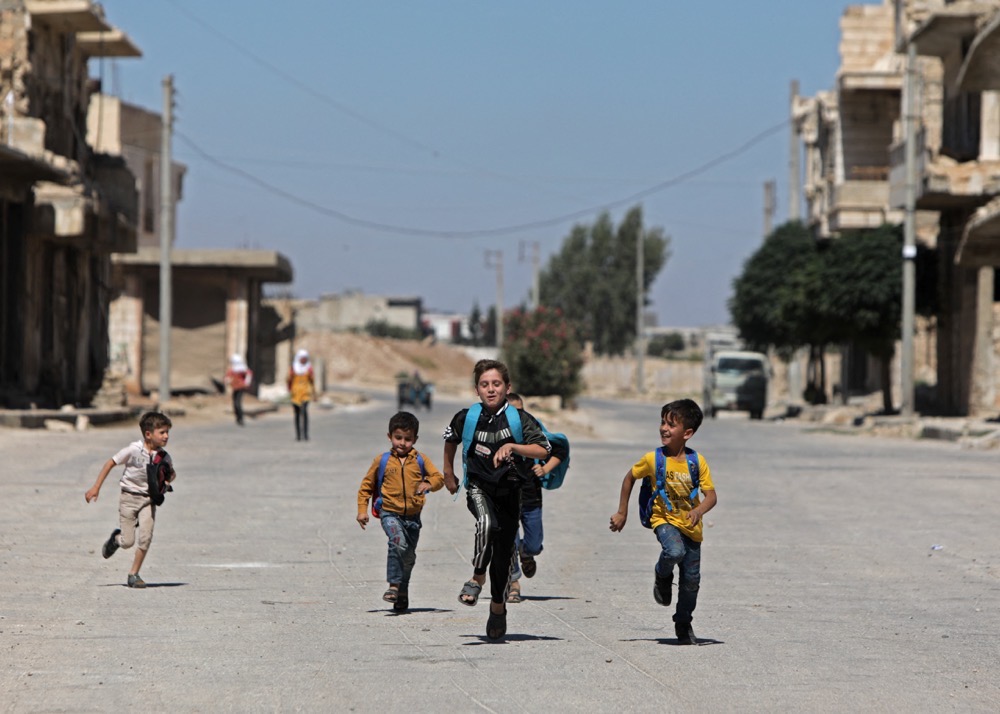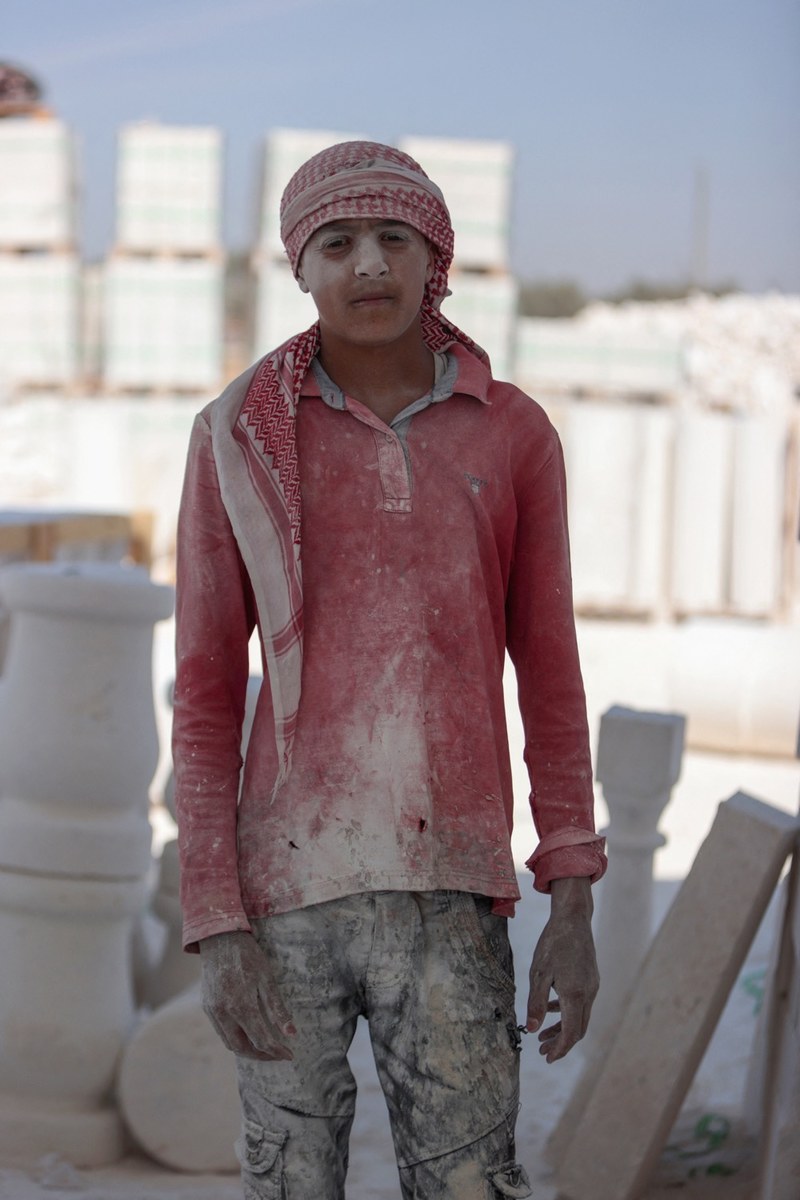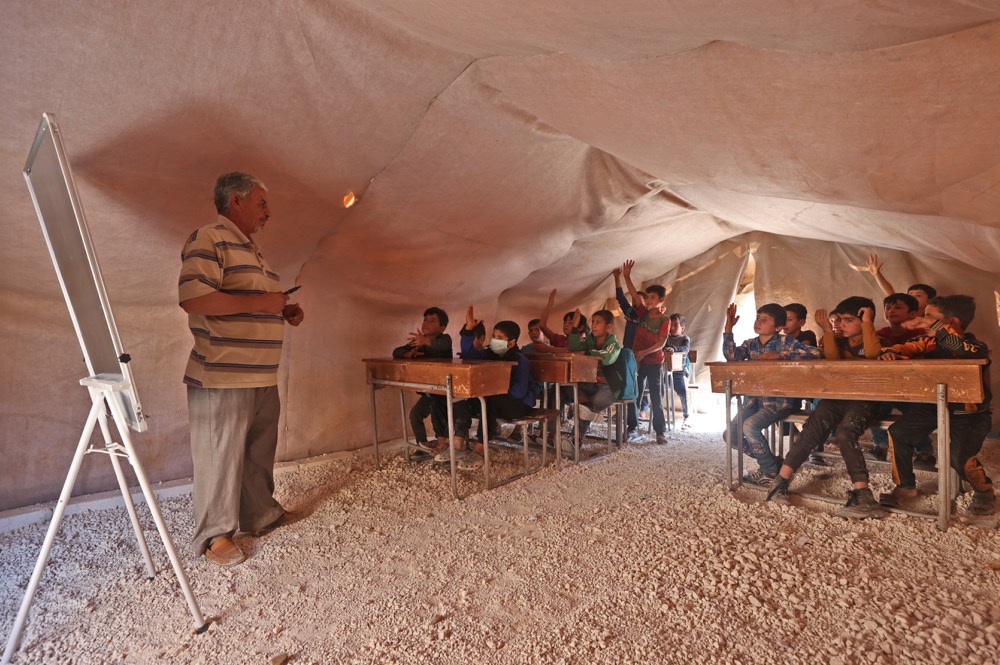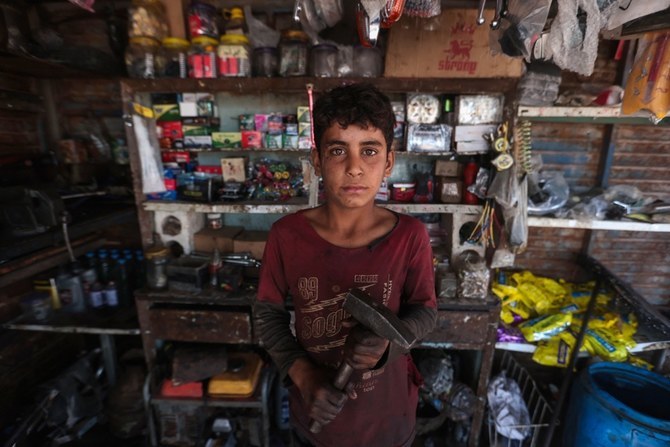LONDON: Syria’s dire economic situation has forced students from impoverished backgrounds to miss school this year, as families cut back on expenses and try to shore up household incomes by sending their children to work instead.
Schools in government-held areas of Syria reopened in September after the summer break, welcoming back an estimated 3.7 million children, according to the state-run Syrian Arab News Agency. However, many others did not show up.
Among those marked as absent were children who had no other choice but to become laborers to earn money and help their families make ends meet as Syrians grapple with a devastating and unprecedented economic crisis.
In an attempt to prevent children from being deprived of their right to education, and ensure they are not forced into exploitative child labor, civil society groups have established projects designed to help vulnerable students continue their studies.
For example, Mart Team, a charity in Damascus, has launched a campaign called “Aqlamouna Amalouna” — which translates as “Hope in our pens” — to support struggling primary school students.

In an attempt to prevent children from being deprived of their right to education, civil society groups have established projects designed to help vulnerable students continue their studies. (AFP)
“After conducting a study to investigate why many students in grades one to six were not attending school, we found that a major factor was the soaring costs of stationery and educational supplies,” Marwan Alrez, the general manager of Mart Team, told Arab News.
“Parents have told us schools demand hefty fees and charges, prompting many of them to remove their children from school and force them into the labor market in order to contribute to the household earnings.”
Donya Abo Alzahab, who has been teaching a second-grade class at a primary school in Damascus for a year, notices how desperate the situation has become for many of her young students, to say nothing of their teachers.
“I was thrilled to start my first job as a schoolteacher,” she told Arab News. “Little did I know it would prove to be a costly, significant challenge, given the lack of much-needed support and teaching aids.”
With some students lagging behind their peers by as much as three years in terms of learning, teachers such as Alzahab often find themselves compelled to spend a substantial portion of their own modest incomes on essential teaching aids, including textbooks, which are not cheap at a time when the value of the nation’s currency has fallen to record lows.

Syria’s dire economic situation has forced students from impoverished backgrounds to miss school this year. (AFP)
Alrez said the average cost of educational supplies for a single primary school student is at least 200,000 Syrian pounds (approximately $16); a backpack alone can cost 100,000 pounds. If schools fail to provide students with textbooks, these can cost parents an additional 50,000 pounds.
Such costs are increasingly out of the reach of many public-sector employees, whose minimum monthly salaries were only recently increased to 185,940 Syrian pounds. At the same time, the government slashed fuel subsidies, sparking rare protests in southern Syria.
Alzahab, who holds a degree in special educational needs, said transport costs alone can exceed 80,000 pounds per month, equivalent to almost half her salary. She also spends 30,000 pounds on teaching aids and 15,000 for a teacher’s planner that has to be replaced every month.
“The only reason why I won’t quit my job is the students, she said. “If I resign, they will be left for a long period without a replacement.”
FASTFACT
• 3.7m Syrian students returned to school in government-held areas in September.
• Economic crisis has made schooling too expensive for many households.
• Some children have become laborers to help provide for their families.
Such a gap in their education would be devastating for her pupils’ learning outcomes, which in many cases are already behind schedule. Of the 30 students in her class, 20 are unable read or write.
A recent report by UNICEF, the UN Children’s Fund, titled “Every Day Counts,” revealed that in 2022, about 2.4 million children in Syria were not in school and an additional 1.6 million were at risk of dropping out.
According to a subsequent UNICEF report covering the period from January to March this year, the figures have not improved. Furthermore, the share of the national budget allocated by the Syrian government to education fell from 7.1 percent in 2021 to 3.6 percent in 2022.
UNICEF estimates that the Syrian civil war, which began in 2011, has damaged or destroyed 7,000 schools across the country. This situation was compounded by the devastating twin earthquakes that hit parts of northern Syria and southern Turkiye on Feb. 6 this year.

UNICEF estimates that the Syrian civil war, which began in 2011, has damaged or destroyed 7,000 schools across the country. (AFP)
The UN agency warned of the danger of a generation of young children who have never gone to school and “will face difficulties in enrolling and adjusting in formal schooling as they grow older.”
Until the economic crisis in the country is brought under control, however, many households will continue to prioritize survival over schooling.
“Syria’s children are quite often faced with a dilemma: whether to support their families to survive or continue their education,” Hamzah Barhameyeh, the advocacy and communication manager at World Vision, an international child-focused charity, told Arab News.
“The Syrian conflict has decimated the education infrastructure and the earthquake has compounded the crisis, leaving schools in need of rehabilitation and school supplies, which in turn has made the choice between education and child labor a much easier decision.”
Alrez highlighted the importance of supporting schoolchildren because “this generation is Syria’s future.”

A UNICEF report says that in 2022, about 2.4 million children in Syria were not in school. (AFP)
His charity’s initiative has so far succeeded in meeting the needs of about 300 primary school pupils in parts of Rif Dimashq, including Maaraba and Sbeneh, neighborhoods of Ghouta such as Zamalka, and the outskirts of Damascus.
The Syrian government has said it recognizes the struggles many students and their families face and is trying to help. The Ministry of Education has urged schools to be lenient when enforcing policies on the wearing of uniforms, for example, according to a report by SANA.
The ministry also called on schools to cut their demands for certain supplies, wherever feasible, to alleviate the burden on poverty-stricken families, at least in part.
Such modest measures are unlikely to make a significant dent, however, given that 90 percent of the Syrian population now lives below the poverty line. Even teachers in government-held areas, such as Alzahab, are struggling to do their jobs despite being innovative and resourceful wherever possible.
The situation is hardly any better for children in parts of Syria outside the government’s control. The earthquakes in February largely affected opposition-held regions in the northwest, where facilities for children had already deteriorated on account of the conflict.
At least 450 schools in the northwest were “damaged to varying degrees” by the earthquakes, according to a report published in April by the UN Office for the Coordination of Humanitarian Affairs. Thousands more have been damaged or destroyed during more than 12 years of civil war, which has been particularly destructive in the northwest of the country.
World Vision currently has six educational projects operating in northwestern Syria, Barhameyeh said, focusing on “school rehabilitation, educational centers, school winterization and teacher training.”
He added: “Those projects also include a livelihood intervention (program) that provides food packages, hygiene kits, school supplies and, in some instances, cash vouchers to reduce families’ need to send their children to work.”
Still, the task of filling up classrooms remains an uphill battle, especially given that more than 1.7 million children in northwestern Syria rely on humanitarian assistance.
“The food crisis and recent cuts to World Food Program programs are actively pushing young boys to head to the labor market and drop out of schools,” said Barhameyeh. “This will have a devastating impact on the future of the Syrian children.”


























